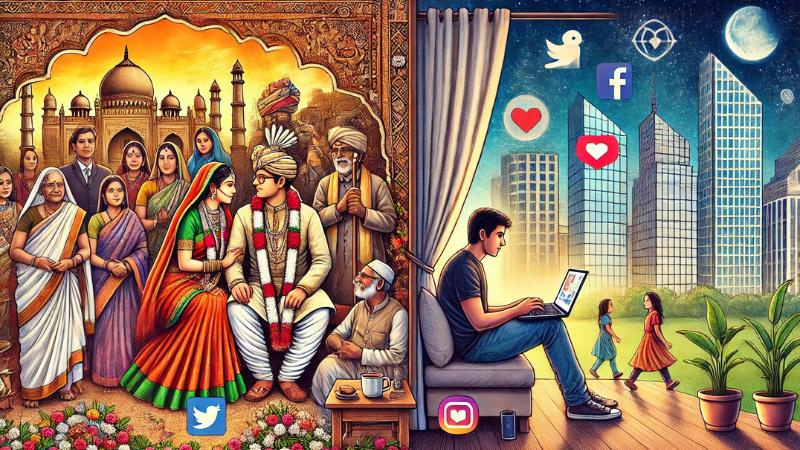
The landscape of relationships in India is undergoing a remarkable transformation. Gone are the days when marriage was considered the ultimate milestone and divorce carried a heavy stigma. Social values, economic independence, and individual aspirations are now redefining how Indians view commitment, family, and relationships. For generations, divorce was rare in India, and remaining single was perceived as an unfortunate outcome rather than a conscious choice. However, changing attitudes have shifted this narrative. Divorce rates are rising, individuals are increasingly embracing singlehood, and the once-rare DINK (Double Income, No Kids) lifestyle is becoming more common.
Rising Divorce Rates in India
For a long time, India held one of the world’s lowest divorce rates, at just 1%. While this was often cited as a positive reflection of Indian family values, deeper examination revealed that social stigma, lack of financial independence, and cultural pressure prevented many unhappy couples from separating. Recent data from a Moneycontrol analysis of the Periodic Labour Force Survey indicates that divorce rates have risen steadily over the past seven years. Notably, this increase is not confined to urban hubs; divorce and separation rates are also climbing in rural areas. According to Gayatri Sapru, CEO of Folk Frequency, financial independence is a key driver behind this change. She highlights that women are increasingly empowered to leave unhappy marriages, thanks to improved access to education and employment. “Women initiate divorces in about 70% of cases globally, and India is no exception,” Sapru notes. “Today’s parents are investing in their daughters' education and skills, enabling them to walk away from unhealthy relationships with confidence.”
Dr Chandni Tugnait, psychotherapist and founder-director of Gateway of Healing, points to changing priorities as another factor. “Marriage is no longer about duty; it’s about mutual respect and personal growth. As digital distractions increase and emotional intimacy becomes harder to sustain, more people are willing to end toxic or unfulfilling marriages.” This shift reflects a growing trend where individuals now value their mental well-being, self-growth, and financial stability over adhering to social norms.
The Rise of Singlehood
For decades, remaining single into one’s 30s was frowned upon in Indian society. Pressure from family, particularly from elders, made it difficult for individuals to consciously choose singlehood without facing judgment. However, modern generations are breaking free from this traditional mindset. For some, staying single offers an escape from restrictive societal norms, toxic relationships, or family pressures. “It’s not about rejecting love or companionship,” says Dr Tugnait. “It’s about rejecting the toxic structures that often accompany those roles. Choosing singlehood allows individuals to focus on their careers, mental well-being, and self-improvement.” Data supports this shift. A study by Bumble found that 81% of Indian women expressed a preference for remaining single rather than entering forced or unhappy marriages. Similarly, a study by Investopedia revealed that 65% of newly married Indian couples now choose not to have children, indicating a shift toward prioritizing careers, travel, and personal freedom over traditional family-building expectations.
Cultural and Societal Impact
The changing perception of relationships has far-reaching implications for Indian society. While this shift reflects empowerment and autonomy, it also raises concerns about long-term social effects. Simantini Ghosh, Assistant Professor of Psychology at Ashoka University, predicts that dating apps, casual relationships, and situationships will continue to gain traction among India’s younger population. “Emotional unavailability will become more common, particularly in urban metros,” she notes. While this trend is evident in upper-middle-class urban India, Prof. Ghosh suggests it may take longer for these changes to reach rural regions, where traditional values remain deeply ingrained. However, she acknowledges potential drawbacks. “We may see a rise in loneliness, alienation, and emotional detachment, especially among elderly populations in rural India, where younger generations are increasingly migrating to cities.”
The Rise of Alternative Lifestyles
The traditional nuclear family model is also evolving. Prof. Ghosh predicts that unconventional family structures, including single parenthood and LGBTQ+ families, will become more widely accepted, especially in urban regions. “It is an audacious hope,” she admits, “but with growing social acceptance, children from non-traditional households may eventually experience the same respect as those from conventional families.” Despite these progressive trends, societal attitudes remain mixed. While urban India is rapidly adopting individualistic values, the majority of the country, particularly in rural regions, still adheres to collective family structures.
Is India Becoming an Individualistic Society?
Prof. Ghosh emphasizes that defining India as “individualistic” is complex. While urbanization continues to expand, 70% of India’s population still resides outside major cities. The push for independence, career ambition, and self-reliance is gaining momentum in cities, but rural areas continue to hold onto traditional family values. “The Indian society has never been monolithic,” Prof. Ghosh concludes. “We will continue to see evolving relationship dynamics shaped by economic shifts, political changes, and cultural evolution.” India’s evolving relationship landscape presents a dynamic mix of empowerment, shifting social norms, and emerging lifestyle trends. As financial independence rises, traditional relationship structures are increasingly challenged. While some celebrate the newfound freedom to live life on their own terms, others worry about rising isolation and declining family values. The future of relationships in India may blend individualistic ideals with traditional values, creating a complex yet evolving social framework. As Gen Z and millennials redefine marriage, commitment, and parenthood, India’s relationship culture will likely continue to shift in ways that embrace both personal choice and societal connection.












































